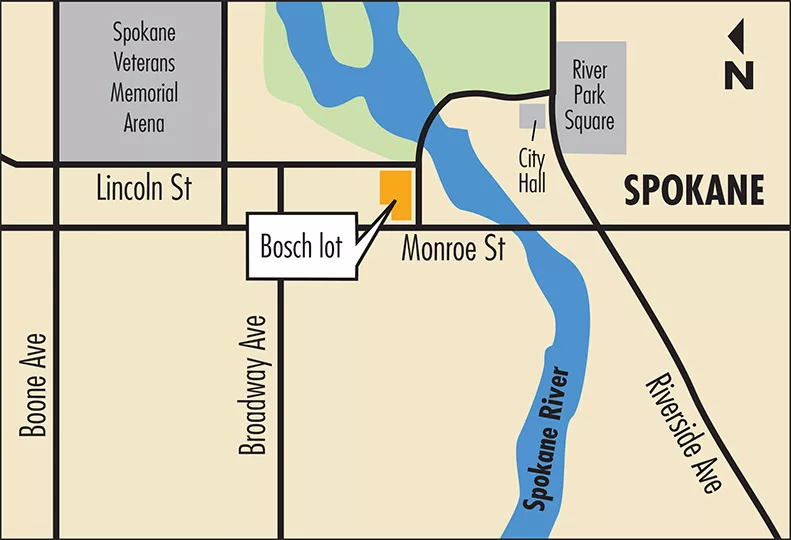
Home » City takes new look at uses for lot near Spokane River
City takes new look at uses for lot near Spokane River
Talks with Spokane Tribe about big cultural center have quieted since 2010

June 20, 2013
The city of Spokane is taking another look at potential uses for a 1.1-acre lot it owns on the north bank of the Spokane River after talks have quieted concerning development of a multimillion-dollar Spokane Tribe of Indians cultural center on that site.
Known as the Bosch lot, the parcel is located on the north side of Bridge Avenue and northeast of the Monroe Street Bridge, essentially across the river gorge from Spokane City Hall. Currently, the city operates a 132-stall parking lot on the land.
Leroy Eadie, director of Spokane Parks and Recreation, says, "I'd hate to see us not do something better with that property."
He says the city has a strong relationship with the tribe, and he doesn't think either party is to blame for the stalled talks. He speculates, however, that the tribe is focusing its efforts on the Spokane Tribe Economic Project, the proposed casino-anchored multiuse development on the West Plains. That project currently is being reviewed by the U.S. Bureau of Indian Affairs. If approved by BIA, the project will go to Washington state Gov. Jay Inslee for approval.
An attempt to reach Spokane Tribe Chairman Rudy Peone was unsuccessful.
In 2010, the city sent out a request for proposals seeking ideas for development of the site. The Spokane Tribe submitted the only proposal, envisioning a 33,000-square-foot cultural center that would cost between $6 million and $8 million to build. Eadie says the tribe's proposal was the only one submitted at that time, and the city began discussing a land-lease agreement with tribal leaders, who consider the land along the river to be part of its ancestral grounds.
However, Eadie says the city and the tribe haven't met on the project for nearly two years—the last meeting, he says, occurred in August 2011. He says at one point, the city offered to send the tribe a letter of intent to sign, but it never did so.
He says the terms the city sought—but that were never agreed to—called for the tribe to submit a business plan for the project within six months of signing an agreement. It also stipulated that construction was to start within three years, and the project would be completed within five years.
"It was a pretty aggressive time line," Eadie says.
Since then, another wrinkle developed in that the Washington state Recreation and Conservation Office determined that a cultural center isn't an acceptable use for that land, Eadie says.
He says the city bought the land in the early 1970s—in preparation for the Expo '74 world's fair—with state grant money that stipulated that the property needed to be used for outdoor recreational purposes.
When the city first entered into discussions with the Spokane Tribe, Eadie says, the state recreation and conservation office gave informal approval, saying a cultural center would qualify as an outdoor recreational use. Last year, however, when the city went to the state agency to get written approval for a cultural center development, Eadie says a different staff member rejected the use.
The city is looking into acquiring similar property in close proximity to the Bosch lot and transferring the outdoor-recreation stipulation to that property. Specifically, Eadie says, the city is researching whether it could vacate Bridge Avenue between Monroe and Post streets and move the outdoor-recreation condition to that property.
As the city begins to reevaluate potential uses for the Bosch lot, Eadie says it's considering improvements that either wouldn't preclude development of a cultural center in the future or that could incorporate some historical information about the tribe.
One potential use might be a Centennial Trail trailhead at the site, which could double as an interpretive center with information about the tribe's history. At this stage, however, Eadie says the parks board is just starting to look at it again.
"They just don't want to see it sit there as a dirt parking lot," he says.
On the other hand, however, the lot generates roughly $70,000 a year in revenue for the city, and the original request for proposals said any development there would have to bring in at least that much annually.
Eadie says that stipulation remains in place.
"Parking is one of our growing revenue streams, and we can't move away from that," he says.
Latest News
Related Articles


_web.webp?t=1769673727)
_web.webp?t=1769673728)
_web.webp?t=1769673735)
